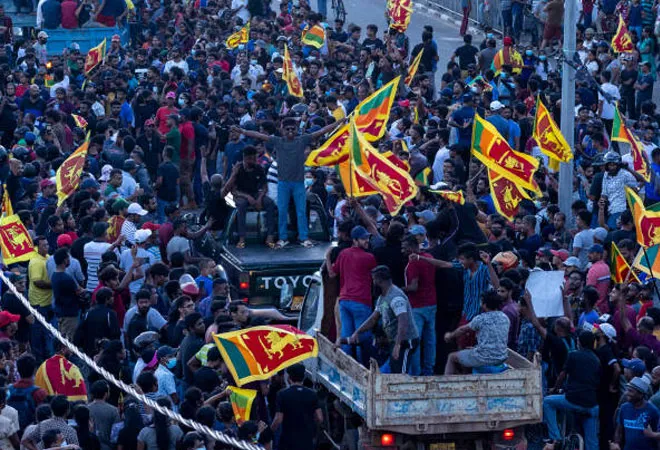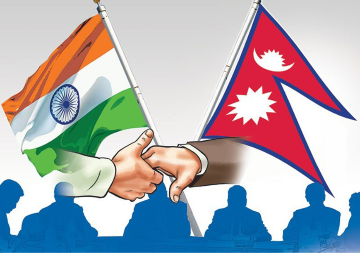
Less than 24 hours after the successful ‘struggle’, or ‘
Aragalaya’ in Sinhala that had caused greater political uncertainty than earlier, Indian High Commissioner Gopal Bagalay was sitting with Sri Lankan Agriculture Minister Mahinda Amaraweera, formally handing over a
40,000-tonne consignment of chemical fertilisers that India was supplying as a part of the line-of-credit to help tide over the island-nation’s unprecedented food crisis, which was only a part of the continuing economic calamity. According to reports, the minister was waiting for the formal diplomatic meeting before putting in his papers.
It did not stop with fertilisers.
Lanka IOC, the joint sector petroleum-product outlet in Sri Lanka in which the public sector Indian Oil Corporation is a partner, too recommenced distribution through its network of outlets, a day after the protests. The company had originally suspended retail operations for two days owing to the much-publicised protest on Saturday.
Nothing explains the strength of bilateral relations than this one episode after (outgoing) Prime Minister Ranil Wickremesinghe had openly declared that ‘India is the only country that has come to our help’ in this hour of need and distress. Weeks after Wickremesinghe’s say-so, the situation had remained unaltered with the Prime Minister’s much-touted western friends and (outgoing) President Gotabaya Rajapaksa’s Chinese allies offering nothing but words—somewhere Beijing was still falling short.
Lanka IOC, the joint sector petroleum-product outlet in Sri Lanka in which the public sector Indian Oil Corporation is a partner, too recommenced distribution through its network of outlets, a day after the protests.
The expectation was that the US-led West was awaiting the International Monetary Fund’s (IMF) decision on a bail-out package with inescapable conditionalities before chipping in big-time, but meanwhile, Wickremesinghe—the one contemporary Sri Lankan leader who appeared reliable was ousted by popular protest. All of it could mean that the uncertainty of the present could continue in a different form, making Sri Lanka even more dependent on the Indian neighbour.
Wait-and-watch approach
In Thiruvananthapuram, a day after the ‘Colombo conundrum’, if it could be called so, India’s External Affairs Ministry
S Jaishankar said that New Delhi was ‘supportive of Sri Lanka, and is trying to help it’. He was careful while commenting on the recent events and developments in that country. “They are right now working through their problems, so we have to wait and see what they do,” the minister said, clearly indicating that India did not intend to get involved in what essentially was a domestic situation, despite the serious repercussions it may have for the neighbourhood as a whole.
Meanwhile, in New Delhi,
Arindam Bagchi, Spokesman of the Ministry of External Affairs (MEA), too reiterated the position. “We are aware of the many challenges that Sri Lanka and its people have been facing, and we have stood with the Sri Lankan people as they have tried to overcome this difficult period,” he said. Bagchi pointed out how as the closest neighbour, India has extended ‘unprecedented’ support of over US$3.8 billion for ‘ameliorating the serious economic situation in Sri Lanka’.
Especially in the light of Saturday’s developments, the spokesman had this to add: “We continue to follow closely the recent developments in Sri Lanka. India stands with the people of Sri Lanka as they seek to realise their aspirations for prosperity and progress through democratic means and values, established institutions and constitutional framework.”
No Indian boots on the ground
The Indian High Commission’s Sunday statement that
New Delhi was not dispatching troops to Sri Lanka, clearly choosing to not interfere in the internal affairs of a friendly neighbour.
The Sri Lankan defence ministry also denied other social media posts that claimed that local troops had been dispatched to the main protest site at Galle Face Green sea-front.
“These reports and such views are also not in keeping with the position of the Government of India,” the High Commission tweeted, without explaining the reasons for such denial. However, the denial possibly became necessary after a section of the local social media began forwarding ruling BJP parliamentarian
Subramanian Swamy’s earlier tweet-call in this regard, asking ‘how India could allow a mob to’ overthrow an elected government.
Independent of all these, the
Sri Lankan defence ministry also denied other social media posts that claimed that local troops had been dispatched to the main protest site at Galle Face Green sea-front. “There is no such attempt to attack or disturb the
‘Aragala Bhumiya', or the ‘struggle site’, Chief of Defence Staff, Gen Shavendra Silva said. Opposition SJB Parliamentarian and war-time Army Commander, Field Marshal Sarath Fonseka concurred—and both were proved right on the ground.
Loaded statements
While there is now
confirmation from Prime Minister Ranil Wickremesinghe on the early reports of President Gotabaya Rajapaksa’s offer to quit on Wednesday, 13 July, with the former’s commitment to quitting alongside, there is not as much clarity. Multiple discussions are yet to come up with an acceptable name for their successors, as a nominee of Parliament with a simple majority will complete the residual term of President Gota.
Incidentally, including Wickremesinghe, who is the lone parliamentarian of the UNP, the nation’s GOP, the incumbent government has a wafer-thin majority of 115 members in a House of 225, including the Speaker. While a section of the mainline Opposition SJB is firm that their leader, Sajith Premadasa, would fit the bill, others are looking at names from the list of 40 ‘rebel MPs’ of the ruling SLPP, who may be able to either obtain the latter’s support or split the party, if required.
The Janatha Vimukthi Peramuna (JVP) and its breakaway Frontline Socialist Party (FSP) have been spearheading the protests in many parts of the country before joining hands with urban middle-class struggle on the Colombo beach-front.
As the closest neighbour whose geostrategic security is linked to Sri Lanka, amongst other South Asian nations, India, is keenly watching the domestic developments without taking sides. At the same time, the Indian policymaker cannot also ignore loaded statements from those like
Tilvin Silva of the centre-left, once-militant JVP that the ‘struggle’ should continue until the formation of a new government leads to a ‘system-change through a transformation of the 74-year-old failed economic, political, and social system’.
According to reports, the Janatha Vimukthi Peramuna (JVP) and its breakaway Frontline Socialist Party (FSP) have been spearheading the protests in many parts of the country before joining hands with urban middle-class struggle on the Colombo beach-front. Unlike in India, for instance, Sri Lanka still has a strong, sector-wise trade union movement and also university students’ unions, mainly affiliated with these two parties.
Talking ‘revolution’
The JVP leaders to a lesser extent and FSP counterparts otherwise have been proposing a ‘revolution’ in forgotten ideological terms from the 20
th century past. How it would impact the upcoming events and developments as protestors occupying the President’s secretariat and official residence have expressed their determination to stay put until their leaders get answers for all their queries on future politics and policies.
New Delhi should also be equally concerned about some of the other neighbouring nations, including adversarial Pakistan and not-so-unfriendly Myanmar, where too spiralling economic crises coupled with an unsettling political climate keep threatening those nations’ future course.
As the friendly neighbour intends on assisting Sri Lanka in the coming months and years, too, as much as in the recent past, India should be looking for signals from the moderate polity that alone has a presence in Parliament and the ideological protestors on the streets. It is still not unlikely that the latter class may work for early parliamentary elections, which others too have been seeking for long, and try to capture elected power through democratic means. In between the question will remain if the JVP with its three MPs would want to join a ‘national government’ as it had promised in the run-up to the weekend protest.
Either way, New Delhi should also be equally concerned about some of the other neighbouring nations, including adversarial Pakistan and not-so-unfriendly Myanmar, where too spiralling economic crises coupled with an unsettling political climate keep threatening those nations’ future course. There may be other candidates in the South Asian region, whom India as the largest country sharing a border with each one of them, has to be equally concerned about. Their names may not have cropped up as yet, but that does not mean that some of those nations may not face near-similar crises, whether economic, political or both.
The views expressed above belong to the author(s). ORF research and analyses now available on Telegram! Click here to access our curated content — blogs, longforms and interviews.



 Less than 24 hours after the successful ‘struggle’, or ‘Aragalaya’ in Sinhala that had caused greater political uncertainty than earlier, Indian High Commissioner Gopal Bagalay was sitting with Sri Lankan Agriculture Minister Mahinda Amaraweera, formally handing over a
Less than 24 hours after the successful ‘struggle’, or ‘Aragalaya’ in Sinhala that had caused greater political uncertainty than earlier, Indian High Commissioner Gopal Bagalay was sitting with Sri Lankan Agriculture Minister Mahinda Amaraweera, formally handing over a  PREV
PREV


